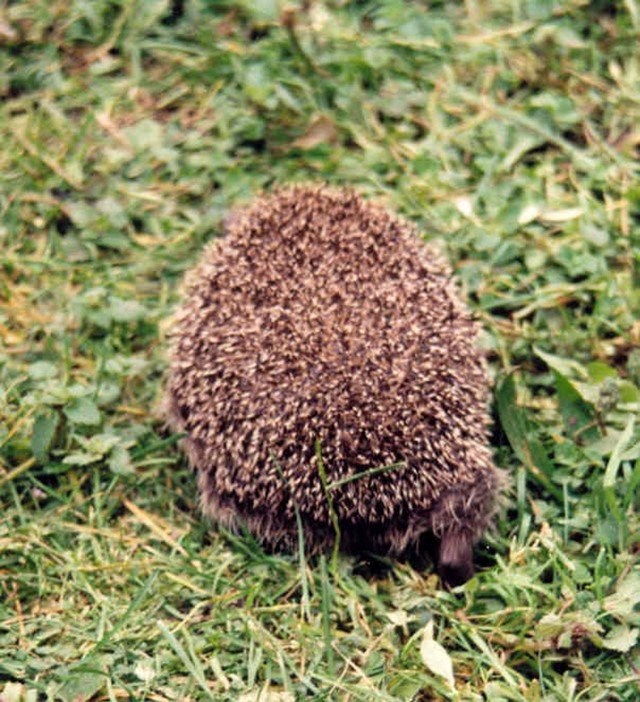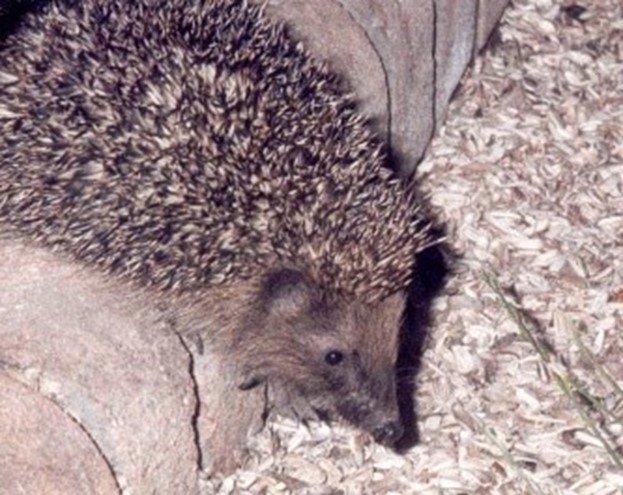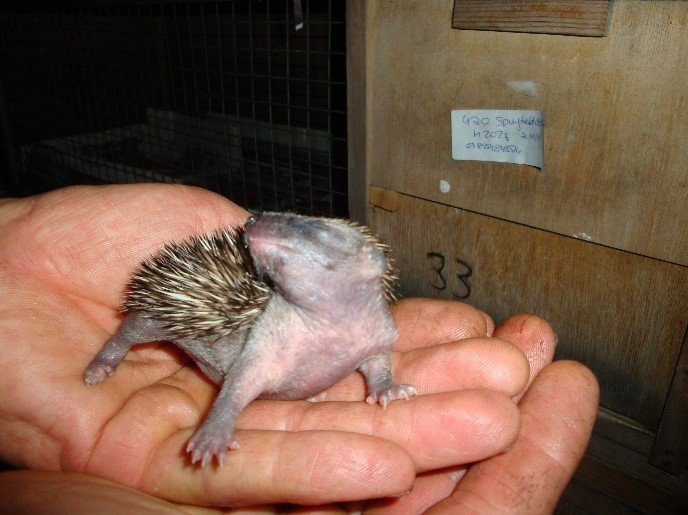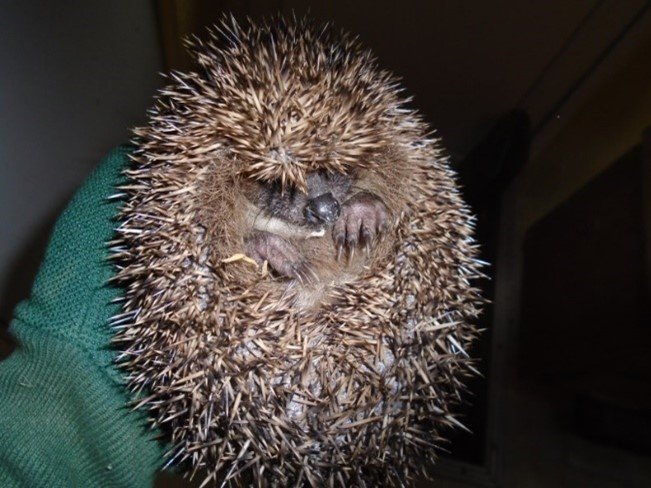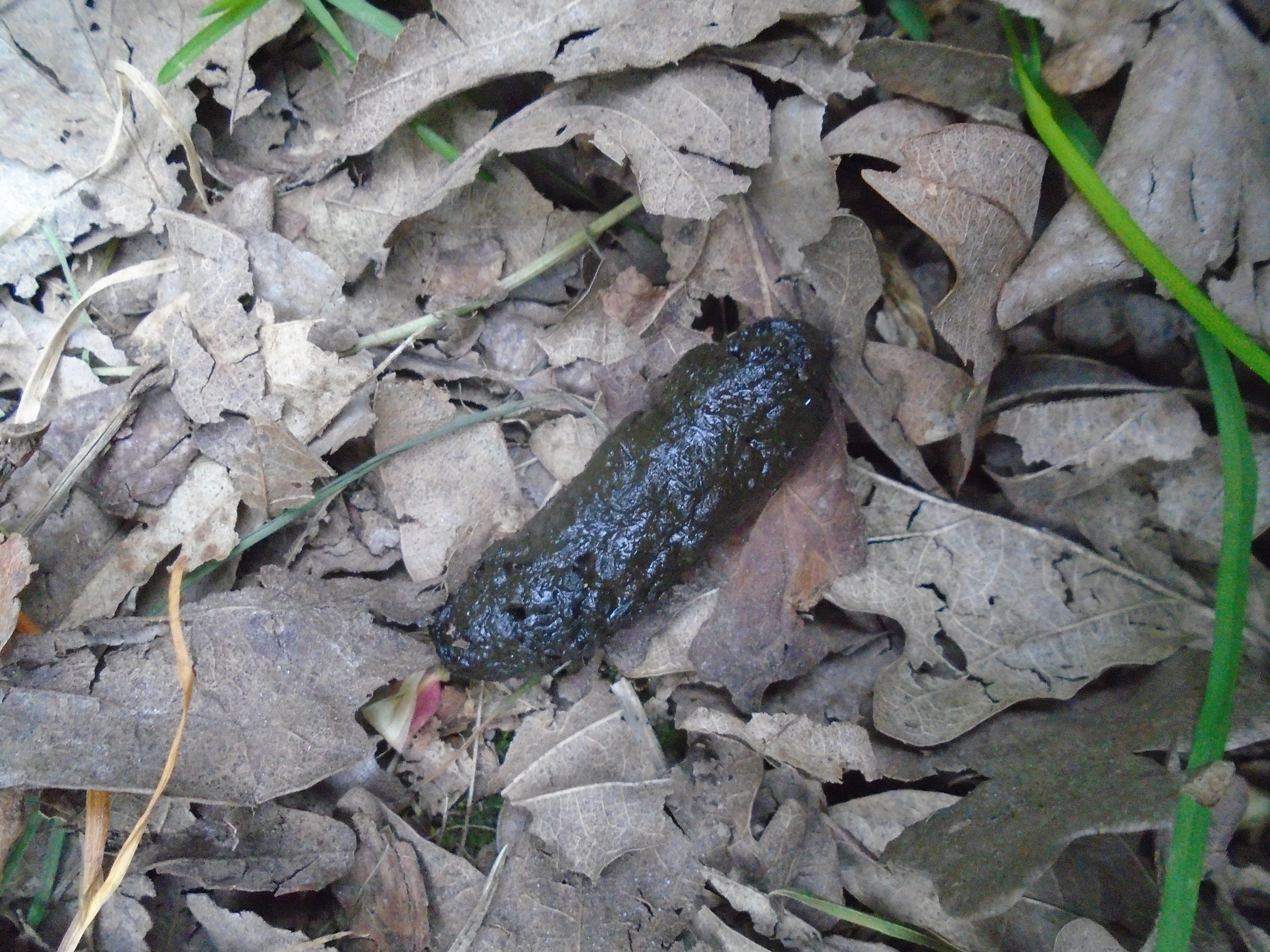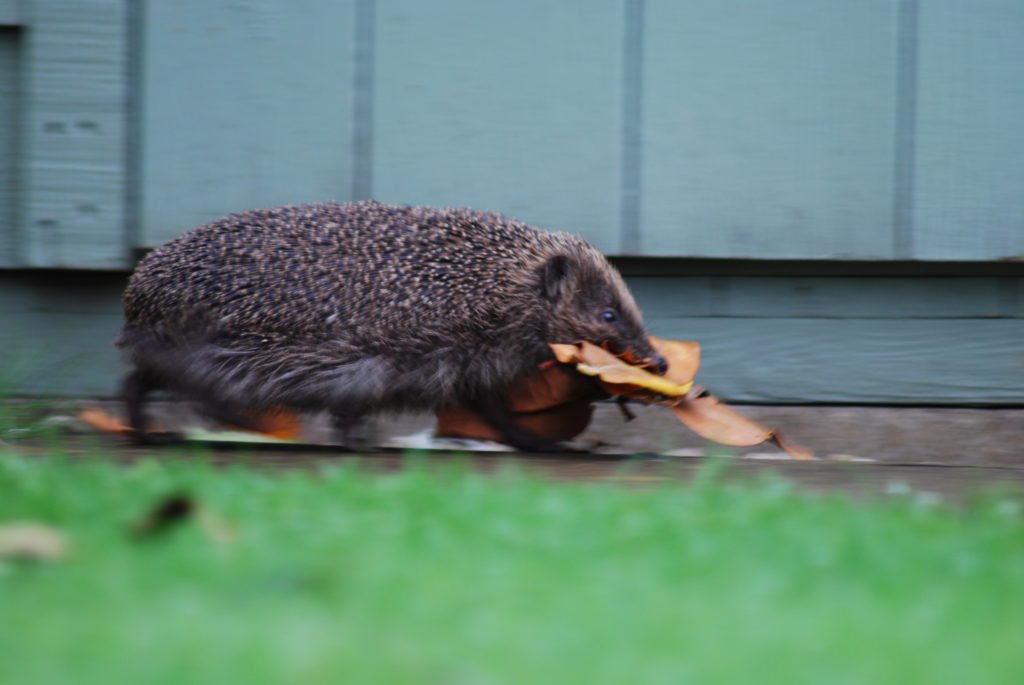FAQs
What are Hedgehogs?
Hedgehogs are the only spiny mammal in Britain, they were introduced to Jersey in the middle of the 19th Century, around the same time as red squirrels. They are a very ancient animal and have been around in their present form for about 15 million years.
Hedgehog FAQs
-
They are nocturnal, which means they normally only leave their nests when it is dusk or dark, but in summer when nights are short, you may see one in the evening or early morning, when it is light, because there are not enough hours of darkness for it to find enough food. Females who are about to or have just given birth are often out foraging when it is still light in mid-summer. Mothers to be often make their nests during the day and mothers may move their young between nests, you may see a hedgehog carrying grass or leaves or even a baby in her mouth or have some older hoglets following her. This is normal behaviour. As long as the hedgehog is active and looks well and uninjured, please leave her alone to go back to her family. You can offer her a dish of water and some dog or cat food, which will be very welcome, especially in dry weather.
Hedgehogs are insectivores and eat a wide variety of insects and invertebrates, which is why they have been called “The Gardener’s Friend” Please garden organically. They are at risk from slug pellets, pesticides and other garden chemicals.
They have no natural predators in Jersey, as we have no badgers or foxes, but there are many hazards for them to face, most of them caused by humans.
Rats, feral ferrets and dogs may attack them or even kill them. Cats will only pose a threat to very young hedgehogs before they are independent of their mother.
The breeding season runs from May to October, males take no part in family life, once they have mated they go off to find their next female. Gestation is about 35 days, mother hedgehogs suckle their babies or hoglets for 4-6 weeks with their very rich milk, so that the babes double their weight in the first week of life. There can be as many as 8 in a litter but 4 or 5 is more usual. At birth hoglets weigh about 20-25g and at about 2 months have grown to about 250g.
From 4 weeks old they look like miniature adults and start to forage for food themselves. Young hedgehogs sometimes get lost or trapped and are found by kind people who contact us, and we take care of them until they are old enough to be independent.
Hibernation: A winter nest or hibernaculum is made of dry leaves and grass, it takes several nights to build and has to be wind and weatherproof so that the temperature inside remains constant whatever the weather does outside. The optimum temperature inside a winter nest is 4 degrees C. The nest is built under brambles or some other sort of support to keep it in shape. They will make several nests in autumn to prepare for winter.
During the winter when their natural food is hard to find, hedgehogs hibernate to save energy, which means they slow their bodies down to an absolute minimum, their breathing, heart rate and metabolism just tick over. If you accidentally disturb a hibernating hedgehog, it would feel stone cold and would be in a very tight ball, you might have to wait a few minutes before you could see it breathe, you might not be sure if it was dead or alive. If it is a big hedgehog weighing more than 450g you should return it to its nest and cover it over with its nest material. If it is a small hedgehog or is hurt or looks sick, then you should seek help.
It is quite usual to see hedgehogs out and about at night during the winter months, especially in mild weather, they often don’t hibernate much in Jersey and may leave their nests to find something to eat and drink. So please provide a bowl of water and some dog or cat food.
They have 2 types of fat, white fat to live off and special lobes of brown fat which act like booster fuel to retart their meabolism when they are waking up. They can lose about a quarter of their weight during hibernation, which is why they are particularly vulnerable during their first winter. Juveniles should weigh 450g by the time the cold weather comes if they are to survive. We care for many underweight autumn juveniles, releasing them in mild spells in winter or in spring.
-
The hedgehog breeding season goes from May to October in Jersey and so hoglets and young hedgehogs can be found out of their nests in daylight during these months and also in the winter.
Should you find any hedgehog, whatever its size, lying out of its nest in the daytime, (unless its nest has been disturbed), please pick it up with gloves, put it in a box, keep it warm and phone 01534 734340 then bring it to us as soon as possible or ask for someone to collect it from you.
-
In the winter, once night time temperatures fall below 5°C, any hedgehog weighing less than 450g (about the size of a small bag of rice) may need help to survive, even if found after dark. Those weighing more than 450g are more effectively helped by supplementary feeding in your garden, if they are regular visitors.
Please ring us for advice as this changes according to the time of year and weather conditions. To weigh a hedgehog, please wear gloves and use an old ice cream carton or plastic container instead of your kitchen scale pan. Hedgehogs weighing less than 450g should be picked up with gloves or in an old towel and brought into the house, put in a box with some clean hay or ripped up newspaper and given some cat or dog food and a bowl of water for the night and then please ring us the next morning and bring it to us or ask for someone to collect it from you. In Jersey you are now permitted to keep wildlife for only 48 hours without a licence.
Any injured hedgehog, should be taken to a vet or brought to us as soon as possible
-
Misguided people sometimes “rescue” a healthy hedgehog in the road at night and put it in their (enclosed) garden to eat slugs and other pests.
This is very cruel because hedgehogs wander long distances every night, especially in the breeding season, and they know their own home area very well.
So if you find an uninjured hedgehog at night in the road, please move it out of harm’s way nearby, but not more than a few hundred metres from where you found it.
During long summer days when the hours of darkness are short, mother hedgehogs often wander away from their nests to forage, well meaning people pick them up, thinking they must be ill, when there is nothing wrong with them and it is obviously imperative that they be returned to the place where they were found as soon as possible, so that their babies do not die from cold, hunger or predation.
download picture of mother hedgehog nest building
At other times, hedgehogs whose nests have been disturbed may be seen walking purposefully to another nest site during the day, these also should be left to go on their way.
-
Hedgehogs are nocturnal, so if they are lying out of their nests during the day, that is a sure sign that something is wrong.
A healthy hedgehog does not “sunbathe” on the lawn. Please phone 01534 734340 if you are in Jersey or your local hedgehog hospital in the UK for advice, even if you cannot see an injury. Because they roll up if they are frightened, it is often very difficult to see if they are hurt. If they are injured we take them to the vet to be examined under anaesthetic.
Hedgehogs found lying out in daylight even if not hurt will very often be dehydrated. The spines on a dehydrated hedgehog will lie flat against its back and not stand up at all angles as they do on a healthy hog.
Baby hedgehogs (hoglets) can be born from May until the end of October in Jersey and they sometimes lose their way at night when learning to forage with mother, if you find one lying in full view in daytime, the flies will also find it and lay their eggs on it, which will hatch into maggots and the hedgehog will die if you do not rescue it.
Please pick it up with gloves or use an old towel and put it in a box, keep it warm, and if it has a pointed face and teeth, it is safe to offer it a small amount of cat or dog food and a dish of water until you can get some help from us on 01534 734340 if you live in Jersey or from your vet or local wildlife hospital if you live in the UK. Or by phoning the British Hedgehog Preservation Society on 01584 890801.
-
If you disturb a nest with a mother and baby hedgehogs so long as none of the hedgehogs is injured or killed the best thing is to leave it alone, cover it over with the material you have cut away and leave the area.
If you disturb a nest of very young hoglets, please seek advice as soon as possible, circumstances vary and we do not want to remove babies when the mother is hiding nearby and likely to return to the nest.
If the nest site has to be destroyed, please do all you can to keep the mother with the babies without touching them with your bare hands. Put a large box, dustbin or bucket over the entire nest and phone for help. Or make sure you are wearing gloves and gently pick mum up first and place her in a dustbin/bucket/box, then pick up all the babies (they have about 5 usually but there can be more) and cover them all with as much original nest material as you can and ring 01534 734340 for immediate help.
If you touch the young with your bare hands, your human smell may make the mother reject her babies.
However, if you find a solitary hoglet and cannot find the nest to return it to, please do rescue it, keep it warm and phone 01534 734340 (or your local carer or vet if you don't live in Jersey) for help urgently, do not feed it cow’s milk, we have special milk replacer to feed it. Hedgehogs cannot digest the lactose or milk sugar in cow’s milk and it can kill young hoglets by giving them diarrhoea.
-
After a period in care, hedgehogs should be released at dusk or after dark on a mild evening, it is OK even in a mild spell in winter in Jersey - as long as they are fat enough to survive hibernation (minimum weight 650g). Damp conditions are good - hard ground (either from frost in winter or drought in summer) makes finding food difficult for them. We always try to put them back as near to where they were found as is safe and sensible. They do know their own home area and so it is usually only those found, for example, in the middle of town or on the beach who get moved away (to the outskirts of town or inland from the beach where they were found).
The hedgehog will have spent some time in an outside pen before release to get acclimatised. To make the transition back to the wild as gentle as possible, we would like you to put out some food and water at least for the first few nights or until it remains uneaten. To stop cats or birds getting the food, you can put it under an upside-down box with a 5"/13cm hole cut out of the side or under a slab on 2 bricks. A bowl of water on the ground all the time, but especially in dry weather is very welcome for all wildlife. And of course if you have gained a regular garden visitor, it would be nice to continue providing extra food for him. Any sort of cat or dog food, either tinned or dry biscuits are suitable. Please do not feed them mealworms, sunflower seeds or peanuts.
The hedgehog will be given to you in a sack of hay which should be put on its side in a sheltered place, near where you found it (under a hedge or bush or by your shed). It will come out in its own time (once you have stopped watching) and go on its way!
IIf you have an enclosed or walled garden please DON’T put the hedgehog inside. It is very cruel to keep a healthy hedgehog in one garden. They need to wander about one mile per night, especially in the mating season.
-
Look for their droppings which are black/brown and sausage-shaped, the size depends on the size of the hedgehog which left them!
This is also the way to check that hedgehogs have emerged from hibernation in the Spring.
Click here to download an image of hedgehog poo








